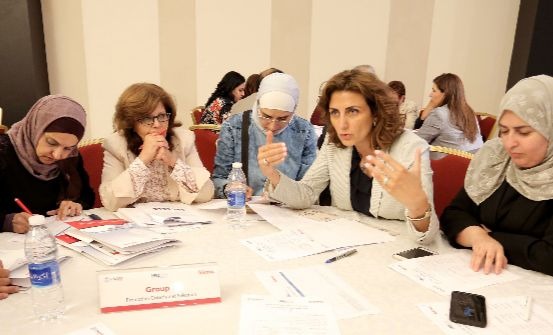
19 Jul HRH2030 Shares New Research Findings on Women’s Leadership in Jordan’s Health Sector
Under the patronage of Her Royal Highness Princess Muna Al-Hussein, HRH2030 facilitated a national event on June 25 to promote women’s leadership in the health sector. Minister of Health, H.E. Prof. Mahmoud Al Sheyyab welcomed close to 250 health and gender stakeholders, noting that “the ministry is constantly working towards the inclusion of women in leadership and management roles and their engagement with the health sector.”
While women account for approximately half of the health workforce in Jordan, they remain underrepresented in top management roles. At the event, HRH2030 disseminated its recent research findings and recommendations exploring “Barriers and Enablers of Women’s Career Progression to Management Positions in Jordan’s Health Sector.” The research results are being used to inform national strategies and policies to strengthen women’s leadership and career progression to top-level management positions in Jordan’s health sector.
According to the study, 69.4 percent of women felt they deserve to be promoted to a higher management position. However, findings also show that women likely face more barriers to career progression than their male counterparts or may hesitate to take up promotional opportunities due to fear of conflict with family and household obligations. Moreover, about 65 percent of female health professionals perceived discrimination against women by supervisors/line managers as a barrier to their career advancement, and 64 percent of male health professionals admitted that men do not like sharing authority with women.
65 percent of female health professionals perceived discrimination against women by supervisors/line managers as a barrier to their career advancement.
Her Excellency Dr. Rowaida Al Maaitah, head of the research advisory committee and advisor to Her Royal Highness Princess Muna Al-Hussein for health and social development, remarked, “[It is] not enough to only elevate women to positions of responsibility; they also need to be given the support and training to take on these roles successfully.”
The mixed-methods research study included more than 3,000 survey respondents and qualitative interviews from a variety of health providers, including the Ministry of Health, private sector, and university hospitals, and spanned a range of health professions, including physicians, nurses/midwives, and pharmacists. The research findings are clustered into thematic areas to support interventions aimed at improving access to and availability of resources such as training; clarifying promotional criteria and selection; investing in networking and mentoring; addressing institutional inequities and discrimination; and strengthening work/life balance options.
Following the research dissemination, Dr. Sawsan Al Majali, head of the Health and Environment Committee in the Jordan Senate, facilitated a panel discussion highlighting successful women’s empowerment initiatives in Jordanian companies and organizations with representatives from Hikma Pharmaceuticals, Biolab, and Sisterhood is Global Institute. Concluding the event, participants interacted through robust roundtable discussions on approaches, opportunities, and challenges to implement the study’s recommendations.
The event was a starting point for introducing new activities, including establishing a women in health leadership network to promote women’s career progression in the health sector through advocating for policy change and strategies to push for gender parity.
“Investing in a highly-skilled workforce, that includes women in leadership positions, will strengthen the health system and improve health outcomes, a cornerstone of Jordan’s continued economic growth, security, and stability,” noted USAID/Jordan Acting Mission Director Nancy Eslick.
Hikma Pharmaceuticals contributed significant financial resources to sponsor the event and is a key private sector partner in this initiative to promote local ownership and sustainability.
Photo: Secretary General of the Jordanian National Commission for Women Dr. Salma Al Nims (second from right) facilitates a roundtable discussion during the national event held by HRH2030 on promoting women’s leadership in Jordan’s health sector. Credit: HRH2030, June 2018.





